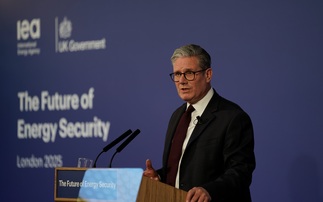Like a husband telling a suspicious partner he'll be home on time, Boris Johnson is telling the EU the UK wants to have 'world-class' environmental standards, but it also wants the freedom to change them if it chooses
Sovereignty and power. Power and sovereignty. It always comes back to sovereignty, and perhaps more importantly, the power that sovereignty grants and what you then choose to do with it.
It is notable that whenever the more astute Brexiters are placed under pressure they quickly default to discussing the sovereignty dividend that will result from leaving the EU. When the sunlit economic uplands disappear in a brooding storm cloud of pay freezes and currency devaluations, when the buccaneering new trade deals demand compromises on everything from chlorinated chicken to orangutan-baiting palm oil, when the conversation shifts to precisely how empty the supermarket shelves and medicine cabinets might be, well, we'll always have sovereignty. It's just a shame you can't eat it.
Hence Boris Johnson's letter last night to EU Council President Donald Tusk and its not unreasonable majoring on both the anti-democratic conceit at the heart of the Irish Backstop and how the potential to diverge from EU rules and regulations is both "the point of our exit" and "central to our future democracy".
Johnson is, of course, right. The backstop is a democratic outrage. If one of the central claims of the successful Leave campaign was that despite the European Parliament and Council there remained a democratic deficit at the heart of the Brussels, then the backstop would put any democratic shortfall on steroids. The idea of leaving the people of Northern Ireland with "no influence over the legislation which applies to them", as Johnson puts it, is understandably hard to countenance. Although, obviously not so hard that Johnson wasn't perfectly happy to vote for precisely this outcome just a few short months ago.
The problem is that borders have two sides and the UK is not the only country concerned about its sovereignty. The prospect of regulation without representation may be a democratic abomination for the people of Northern Ireland, but so too is the prospect of a single market without an enforceable border for the people of the EU. The backstop was always a wholly imperfect attempt to solve an irresolvable constitutional riddle, and all without antagonising the fundamentalists with the guns. It is where the immovable object and the irresistible force of Brexit met, all within the crucible of combustible historical grievances and religious enmities.
It remains to be seen whether a fresh attempt to wrestle with the border conundrum can deliver a workable solution or whether the UK is now 73 days away from a crash out no deal Brexit and all that entails. Tusks initial blunt response to Johnson's vague overtures in pursuit of "flexible and creative solutions" does not bode well, although until 11:59 on October 31st hopes will remain that a fresh fudge can be agreed that averts the return of a hard border.
However, regardless of what happens next Johnson's framing of the potential for environmental regulatory divergence as the "point of our exit" is informative for businesses and investors, and not just for the confirmation that there is still a point to the whole endeavour.
It is worth considering Johnson's argument in its entirety. "[The backstop] is inconsistent with the UK's desired final destination for a sustainable long-term relationship with the EU," he writes in his letter to Tusk. "When the UK leaves the EU and after any transition period, we will leave the single market and the customs union. Although we will remain committed to world-class environment, product and labour standards, the laws and regulations to deliver them will potentially diverge from those of the EU. That is the point of our exit and our ability to enable this is central to our future democracy."
It is, in short, about the principle of sovereignty. The government wants the freedom to diverge from environmental rules, it just might not exercise that freedom and if it does it will only do so in pursuit of "world-class" standards.
Crucially, this is not the first time Johnson has presented this argument. Last year he expanded on its further, sketching out why the option for regulatory divergence should be at the very heart of the Brexit project. It was an argument that centred on both the humble newt and a Dyson vacuum cleaner.
Again, it is worth considering Johnson's comments in full. "We can simplify planning, speed up public procurement, and then perhaps we will then be faster in building the homes that young people need," he said of the regulatory upsides Brexit might offer. "We might decide, we might, that it was absolutely necessary for every environmental impact assessment to monitor two life cycles of the snail or build special swimming pools for newts, not all of which they use in my experience. But it would at least be our decision to do that."
And the same principle, according to Johnson, should apply to the EU energy efficiency rules, which have been widely credited with slashing European carbon emissions, driving innovation around the world, and saving consumers millions of pounds a year. "It is all about voluntarism," he explained, coming perhaps closer than he has ever come to elucidating his political and moral philosophy. "It is all about who decides. When it comes to EU standards for washing machines or hairdryers or vacuum cleaners or whatever, it may very well make sense to remain in alignment as a matter of choice. As something we elect to do. I am sure for the purposes of supply chains there are many businesses who understand the need for that. But I don't think we should commit as a matter of treaty that forever and a day we are going to remain locked into permanent congruence with the EU."
It is akin to a man telling his suspicious partner: "Look, darling, I'll definitely be home by midnight. You can trust me. Of course you can. It is just that I disagree with the idea of a curfew on principle, because, well, just in case, you know?"
As the Remain campaign found three years ago and as those opposed to Brexit continue to discover, this is a very difficult argument to counter? What is wrong with choosing our own rules? Why shouldn't the UK have the freedom to introduce its own regulations? Why can't we 'take back control'?
The answer is nothing, in principle. The issue, as so often with Brexit, arises with the practical implications that flow from the philosophical debate.
For businesses and investors three scenarios flow from a Brexit that insists UK environmental regulations are defined by "voluntarism". The first is the UK has the right to diverge from EU rules but chooses not to, which would have minimal direct impact but would increasing policy uncertainty with each electoral cycle. The second is the UK does diverge from EU environmental standards, but does so in a way that UK regulations really do remain "world-class". This may result in broadly positive environmental outcomes, but it would also create a patchwork of regulations companies operating across the UK and Europe have to comply with and potentially lead to competitiveness issues. The third is the UK diverges from EU rules and does so in a way that undercuts Brussels in an attempt to bolster short term competitiveness, attract alternative trading partners, and generally engineer a "race to the bottom" that harms the environment and hampers the development of a greener economy at every turn.
Ministers have been swift to insist that only the first and second options are on the table, that nothing will tempt them down the path of deregulation. But these protestations are repeatedly undermined by Ministerial colleagues who openly lust at the prospect of a smaller state, Johnson's own past comments suggesting that the definition of "world-class" environmental standards is in the eye of the beholder, and the very real risk of intense geo-political and economic pressures being brought to bear post-Brexit in an attempt to convince future governments to drastically diverge from current Ministers' stated environmental aspirations.
The likeliest logical outcome should be the continuation of relatively close alignment between UK and EU environmental frameworks. There may be some modest divergence with regards specific green rules, but the broad environmental outcomes, goals, and principles would remain largely in lockstep. That was the assumption that drove the original Withdrawal Agreement and its detailed environmental safeguards. It is also the assumption that will drive the eventual negotiations for a new UK-EU trade deal. Again, the UK is not the only entity that has sovereignty to protect and exercise. The EU will demand that if the UK wants free trade with the world's largest single market then adherence to certain environmental regulations will be non-negotiable. Breaching such rules would be an invitation for legal actions and sanctions.
But Brexit is not being driven by logic alone. The risk of the autumn's near-inevitable constitutional crisis opening the door for a government that weaponises the nascent culture war over environmental issues and seizes on Johnson's regulatory "voluntarism" to orchestrate a rapid roll-back of environmental policies and rules cannot be ruled out.
Of course, you could counter that such a scenario would be sovereignty and democracy in action, even as a government elected on 35 per cent of the vote and without a manifesto worthy of the name proceeded to demolish a green body politic that has broad public support. You may even have a point.
But the counter-argument that the forces of Remain have never been able to effectively marshal is that the pooling of sovereignty is in itself an act of sovereignty. The adoption of shared rules that are determined by both an elected European Parliament and a Council of elected governments is an exercise in both giving up and exercising control. Yes, the UK may have to consider the energy efficiency of its products, but so too do our neighbours, ensuring that we cannot be undercut by our largest trading partners. Johnson may argue that we should not commit as a matter of treaty to "permanent congruence with the EU", but such treaties cut both ways, they protect as well as restrict. Everyone has to build swimming pools for newts - metaphorically speaking, of course, Johnson's complaints were, as is so often the case, a fantastical exaggeration.
The UK gets a lot from such alignment, and could continue to do so, if it opted for a trade deal that incorporated a high level of environmental co-operation. It gets access to the world's largest market, regulations that have frequently driven innovation, improved environmental outcomes, and when a member state elects a government that would actively harm our shared environment some safeguards against it doing so. Play its cards right and avoid a no deal Brexit and the Johnson administration may even get the best of both worlds through a deal that ensures environmental outcomes are aligned but gives the UK a bit more freedom to tailor green regulations to its specific situations.
But if it crashes out of the EU and finds itself desperately trying to rush through new trade deals with the likes of the US and Malaysia at the same time as facing populist, polluter-funded calls for a relaxation of the UK's environmental governance regime, then the fixation on regulatory divergence could see the environmental costs of Brexit spiralling upwards alongside the economic costs.
It is still all about sovereignty and power, just not necessarily in the way Johnson envisages.










